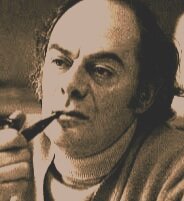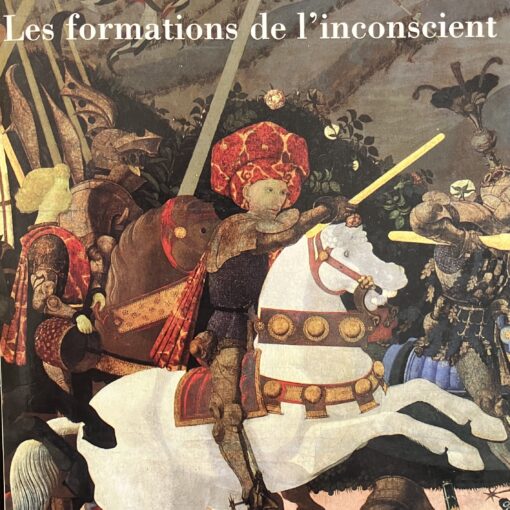By Anissa Braham
[Editor’s note: Anissa Braham is a master’s student at the École des hautes études en sciences sociales (EHESS). She is a graduate of the master’s degree program in Philosophy from Université Paris 1 – Sorbonne (2022). Braham is currently writing a master’s thesis on heterodox critiques of capitalism through an archival study of the review of the Situationist International]
The writings and practice of Claude Lefort (1924-2010) are exemplary for their radical and transversal heterodoxy. Anti-utopian and resolutely historical, Lefort’s thought invites us to abandon all practical prescription, all direction, all programmatic formulation, in order to confront the present of politics in all its complexity, and to imagine from it new openings. Lefort’s dense body of work decorrelates the idea of revolution from that of program, and assumes conflict rather than seeking, like so many philosophical systems, to absorb it. A student of Merleau-Ponty, with whom he discovered the work of Marx (at a time when Marxist studies were excluded from universities and Marx was not taught), Lefort joined the Parti Communiste Indépendant (PCI), a Trotskyist organization parallel to the French Communist Party (PCF), in 1944. He left at the end of the 1940s, and in 1949 co-founded the group and journal Socialisme ou Barbarie with his friend Cornélius Castoriadis, another dissident he had met in the PCI.
From the very first issue of the magazine, the editorial committee declares, by way of presenting the group’s objectives which its members wish to root in a critical path: “we believe that we represent the living continuation of Marxism in contemporary society” (Soub n°1, 1949, page 1). Against the ossification of Marxism and Leninism’s construction of its method as a science, Socialisme ou barbarie takes up the critique of bureaucracy where Trotskyism had damaged it in an unsatisfactory reformism, engaged in a struggle for leadership and power against the Stalinists. The social-barbarian critique of bureaucracy thus encompasses both Stalinism and Trotskyism, the politics of the Bolshevik party and that of the Fourth International. Lefort would turn this militant critique of bureaucracy towards a radical critique of the totalitarian phenomenon, while his comrades sought to construct a new theory of revolutionary organization, councilist and horizontal, by opposing state socialism and Marxist orthodoxy with a new, libertaire (liberty-oriented) and critical reading of Marx.
While Lefort was impressed by Castoriadis’s in-depth knowledge of Marx’s work, the differences between the two men, driven by two radically different visions of the objectives of the group and the journal they had co-founded, led to the break-up in 1958, when Lefort left the Socialisme ou barbarie adventure for good. Castoriadis wanted to create a new party, a new workers’ organization for the revolution, whereas for Lefort, the rejection of bureaucracy implied a generalized critique of all forms of pretension to leadership (or even representation) and the conquest of power, recreating the subordination of a base to a summit. Highly critical of his militant experience, his positions on the USSR and totalitarianism have often led to his thinking being reduced to that of a radical anti-communist siding with the liberal Western bloc in the Cold War. These facile views have no regard for his complex thinking on democracy, which he does not reduce to its institutions, and even less to the criterion of their stability, since he also refers to them through the movements of contestation that permeate them and constantly evolve their norms. Indeed, in 1981, on the eve of the presidential elections between Giscard d’Estaing and Mitterrand, he underlined the cynicism of a bourgeoisie for whom democracy is both reduced to the ballot box, and to a metaphorical argument against totalitarianism, whether Fascist or Soviet, in whom to see a radical Other, while maintaining a historical strategic complacency towards these regimes (Lefort. 1983, p. 34-35).
By the end of the 1950s, Lefort’s quarrel with Socialisme ou barbarie had already revealed the essential structure of his thought: a philosophical preference for disorder over organization. A remarkable idea in Lefort’s thought is that democracy institutionalizes conflict and multitude, or rather, class struggle. Contrary to the campism that structured intellectual debate during the Cold War, Lefort argues that democracy is nowhere a definitive fact, and manifests itself rather as the opposite of the immutable in politics: conflict and inventiveness. Thus, to think of democracy with Lefort is to think of it in its non-definitive dimension, as the only regime that remains open to the possible. By accepting a confrontation with disorder, the common thread of critical thought rooted in a historical reading of the political, Lefort makes conflict a component of democracy rather than a moment or means of building a revolutionary society. He also contrasts this acceptance, or even praise, of conflict with all the “desires for homogenization” that preside over grand projects, those of socialism or, on the contrary, those of conservative regimes evolving through the notion of order (Chollet. 2014). Lefort thus elaborates a thought of the present, an ontology like his master Merleau-Ponty, at odds with both dialectical materialism and conservatism. Indeed, the 1960s and 1970s were still marked by this liberty-oriented commitment, through the prism of which he proposed a theory of democracy, the state and law. In 1968, he published his first critical collection of the events of the spring, entitled La brèche (The Breach), with his friend Castoriadis and Edgar Morin. For Lefort, May 68 was a “year zero” for democracy, in which he hailed a moment of overcoming political leadership within the social movement, an embrace of conflict as a democratic moment that resisted all forms of leadership in favor of radical autonomy.
Consolidated in the 1950s, but coming to maturity in the 1980s, Lefort’s thinking on the political is centered around a historical and philosophical analysis of totalitarianism. As a negative, ontological and historical way of thinking about politics, Lefort’s work modernizes the categories of Western political philosophy, while constantly invoking traditional authors such as Machiavelli. The elementary structure of this modernity is thus based on the phenomenon of the disincorporation of power, which becomes diffuse and multiple. It is through the prism of this concept of disincorporation that we shall attempt to approach Lefortian theory of power.
In 1981, Lefort published L’invention démocratique: les limites de la domination totalitaire, a collection of articles published between 1950 and the late 1970s, followed by Essai sur le politique. XIXème-XXème siècle in 1986. In these essays, Lefort takes on the philosophical and historical responsibility of defining totalitarianism in its singularity, as an event of our modernity. Totalitarian regimes, unlike monarchies, incorporate a bureaucratic dimension and seek to achieve absolute unity of all sections of society, by absorbing the people, reduced to their elementary and abstract unity, into the figure of the ruler.
Lefort thus articulates his history of power with an ontology of the figures of the people, the sovereign and the ruler, and questions their entanglements and disentanglements throughout history. In the tyrant of the totalitarian regime, the unity of the ruler with the people is founded on a principle of tautological incorporation: the tyrant is the people, the regime is the people. The subjectivation of the people takes place in the person of the leader, and in the designation of a foreign enemy, a demonized radical Other. Lefort’s definition of totalitarianism is historically grounded in the experience of the USSR, since he refuses to include the universal in his analysis of politics. The “one-people”, whose unity is realized in the figure of the leader, is opposed by the multitude within democratic societies, where power acts as an empty place, unlocatable in reality because it is not consubstantial with individuals and groups, and is therefore reduced to its symbolic dimension. For Lefort, the symbolic and the imaginary are thus constitutive of democracy and the formation of modern states. He highlights Marxism’s inability to think about the modern state, because as a political project, it aims to overcome this imaginary dimension, equating it with alienation, by absorbing it into a positive proletarian power. For Lefort, this reabsorption of the symbolic dimension is also at the heart of the totalitarian project, which ultimately elaborates in its place another fiction, that of the absolute, anhistorical unity of the social body. His conception of the people and the mechanisms of their subjectivation by political power thus radically deviate Lefort’s thinking from Marxism, and from his conception of social classes as reduced to a struggle for power.
In his vision of democracy, modernized by the experience of the gulag, Lefort abandons the idea of the people’s adherence to the authority of power and, therefore, of the contract that is structuring in Machiavelli and the Enlightenment. If democracy is the political regime of human coexistence, he distinguishes coexistence from even tacit unity. Lefort sees democracy as the age of radical disembodiment, of the atomization of the figure of the social body, the figure of the king and the One into a multiplicity of actors. The condition of democracy, then, is not the conquest of power by a group or class, even an oppressed one, but the decentralization of power, which no longer finds any place to be concentrated, and thus monopolized. A democratic society is thus one in which no one possesses power. We can even radicalize this negative conception of democracy by arguing that it can be used to describe all forms of opposition and conflict within totalitarian and democratic regimes, and that it is not confined to the stability of institutions. It implies the action of agents, in a participatory or insurrectionary dimension. Finally, Lefort contrasts the figure of the king and tyrant, a positive manifestation of power, with that of the ruler, whose person is decorrelated from power because he or she is replaceable. The ruler, interchangeable at the whim of the electoral process, is not consubstantial with power, unlike the king and the tyrant.
The 1980s were also a time of consolidation of his theory of totalitarianism through the prism of law, and in particular human rights in his text “Droits de l’homme et politique”, collected in 1981 in L’invention démocratique. A reader of Arendt, whom he mobilizes in his theory of law, Lefort refutes both liberal individualism in matters of law, and the Marxist critique of the juridical (Simard. 2015). Lefort’s thinking, always historical, integrates the experience of Soviet dissidents in the definition of an “ideal” law, emancipated from its incarnation without falling into the register of abstraction. Theorizing a “disembodied law”, in the 1980s he introduced a distinction between the rule of law and the democratic state. In the democratic state, the law is not only institutionalised by law, but is also constantly reinvented in response to mobilizations, as the law is not “immanent to the order of the world” (Lefort. 1986 p. 46). Synonymous with movement, disorder and autonomy, the “democratic state”, in contrast to the “rule of law”, is thus, for Lefort, “the experience of rights that are not already incorporated”, and “it is the theater of a contestation whose object is not reduced to the preservation of a tacitly established pact, but which takes shape from foci that power cannot entirely control. From the legitimization of strikes and trade unions, to the right to work and social security, a whole history has thus developed on the basis of human rights, a history that transgresses the boundaries within which the state claims to define itself, a history that remains open.” (Lefort. 1983 p.69).
In a democracy, inventiveness coexists with the notion of right and with struggles for new rights. Law is thus intrinsically linked to social relations. Lefort thus refutes the idea of fundamental rights insofar as it places the foundation of rights[1] outside concrete and historical individuals, while rejecting any positive approach to law, which, in order to differentiate and autonomize itself from the spheres of power and knowledge, must also integrate a symbolic and negative dimension. This foundation of law outside individuals is, moreover, contested by the democratic idea itself, since democracy is precisely the regime that abolishes transcendence in favor of the political, and assumes, without sacrality, the realm of the symbolic as a component of the political. Law, in the symbolic dimension that Lefort claims here, is thus intrinsically linked to politics, and guaranteed by human coexistence, from which it is inseparable. Lefort thus credits Marx with proposing an analysis of right that breaks down this myth of the foundation, in order to return to history, to “concrete men”, and to denounce, behind the abstract and universal categories of equality and freedom, the historical oppressions that structure social relations and relations of power (Lefort. 1986 p. 27). Thus, Lefort’s theory of the disincorporation of law seeks to question the “rightful place” of law as the condition and object of new struggles for emancipation.
Lefort’s thinking can thus be described as resolutely and radically liberty-oriented in its project and method: not to shrink from any form of critique and reflection, not to yield to any direction, to any pressure from history, even if it means sinking into a conception of power that could be described as pessimistic and negative. It presents us with a challenge: to think critically without perspective, to think power without system, without conquest.
Notes
[1] “We can say nothing rigorous about a politics of human rights until we have examined whether these rights have a properly political meaning, and we can say nothing about the nature of the political that does not involve an idea of human existence or, what amounts to the same thing, human coexistence.” (The Democratic Invention, “Human Rights and Politics” (I), page 48, 1981)
Bibliography
Works
Lefort, C. L’Invention démocratique. Les limites de la domination totalitaire (1981), Paris, LGF “Livre de Poche – Biblio Essais”, 1983.
Lefort, C. Essais sur le politique : XIXe et XXe siècles, Paris, Seuil, 1986
Articles
Chollet, A. (2012). Le désordre contre l’organisation : sur les divergences théoriques entre Lefort et Castoriadis à l’époque de Socialisme ou Barbarie. In P. Caumières, S. Klimis, & L. Van Eynde (éds.), Socialisme ou Barbarie aujourd’hui (1). Presses universitaires Saint-Louis Bruxelles. https://doi.org/10.4000/books.pusl.719
Revel, J. (2018) . Portrait de Claude Lefort en jeune homme. Raison publique, N° 23(1), 21-36. https://doi.org/10.3917/rpub1.023.0021.
Simard, A. (2015). Les deux corps du droit. La nature et le rôle du droit dans la pensée de Claude Lefort. Politique et Sociétés, 34(1), 61–83. https://doi.org/10.7202/1030101ar





